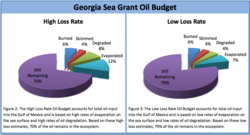Almost 80 percent of BP's spilled oil still threatens Gulf, report finds
 The recent federal report claiming that the "vast majority" of the estimated 200 million gallons of oil spilled into the Gulf of Mexico by the BP catastrophe has either evaporated or been burned, skimmed, recovered or dispersed sounded almost too good to be true.
The recent federal report claiming that the "vast majority" of the estimated 200 million gallons of oil spilled into the Gulf of Mexico by the BP catastrophe has either evaporated or been burned, skimmed, recovered or dispersed sounded almost too good to be true.As it turns out, it was too good to be true.
A report [pdf] by five prominent oceanographic experts released this week by Georgia Sea Grant and the University of Georgia concludes that up to 79 percent of the oil released into the Gulf from the BP disaster has not been recovered -- and remains a serious threat to the ecosystem. (Click on the charts above for a larger version showing the new report's calculations.)
"One major misconception is that oil that has dissolved into water is gone and, therefore, harmless," says author Charles Hopkinson, director of Georgia Sea Grant and a professor in UGA's Department of Marine Sciences. "The oil is still out there, and it will likely take years to completely degrade. We are still far from a complete understanding of what its impacts are."
The other authors were Samantha Joye and Ming-yi Sun of UGA's Department of Marine Sciences and Jay Brandes and Richard Lee of the Skidaway Institute of Oceanography.
The researchers analyzed data from the Aug. 2 National Incident Command report, which calculated an "oil budget" that was widely interpreted to suggest that only 25 percent of the spilled oil remained.
Why the dramatic difference in conclusions between the two studies? Sea Grant and UGA scientists estimate that most of the oil classified as dispersed, dissolved or residual is still present. The NIC report, on the other hand, has been interpreted to suggest that only the "residual" oil is still actually present.
The Georgia researchers estimated how much of the oil could have evaporated, degraded or weathered and concluded that 70 to 79 percent of the spill oil remains. They showed that it was impossible for most of the dissolved oil to have evaporated since large plumes remain trapped in deep water.
"The news media's tendency to interpret 'dispersed' and 'dissolved' as 'gone' is wrong," the report concludes. "Dispersed and dissolved forms can be highly toxic."
(Charts from the Georgia Sea Grant/University of Georgia report, titled "Current Status of BP Oil Spill.")
Tags
Sue Sturgis
Sue is the former editorial director of Facing South and the Institute for Southern Studies.
